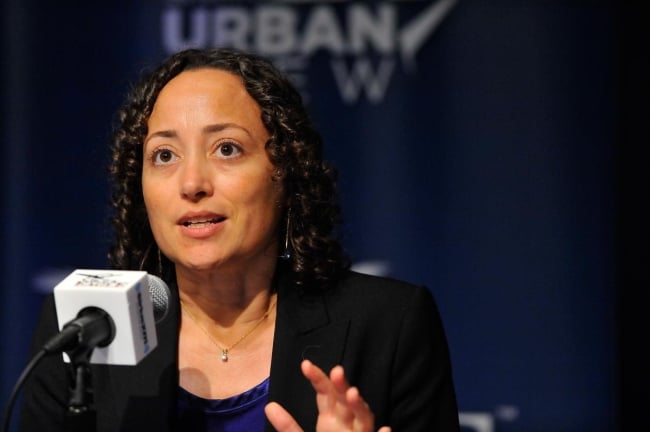You have /5 articles left.
Sign up for a free account or log in.

Catherine Lhamon
Larry French/Getty Images
President Biden intends to nominate Catherine Lhamon to return to a position she held during the Obama administration as assistant secretary for civil rights at the Department of Education, paving the way for familiar civil rights policies.
If she’s confirmed by the Senate, Lhamon will take the lead on issues in education related to race, sexual assault and harassment, and LGBTQ rights -- and she’s expected to be active and aggressive in her approach.
“My guess is that not only will they continue many of the things that they did in Obama's second term, they will probably be more aggressive because I think that's where the center of the Democratic Party is now,” said Shep Melnick, a professor of political science at Boston College and author of The Transformation of Title IX: Regulating Gender Equality in Education (Brookings, 2018).
Lhamon served as assistant secretary for civil rights from 2013 to 2017, when she was a part of an administration that ramped up enforcement of Title IX complaints against colleges and carried out investigations that were costly and lengthy, said Melnick. During her tenure, the office threatened to withhold federal funding to colleges that were in violation of Title IX -- the law that prohibits sex discrimination at federally funded institutions -- which Lhamon said was “an effective tool for us” and was used as leverage in negotiating with colleges and universities.
As the department reworks the Title IX regulations established by the Trump administration, Lhamon will likely play a key role, said Melnick. But the process will be long -- the department is scheduled to begin hearings on the issue in June, which is only the first step.
In the near term, Lhamon may look to reinstate policies from her previous tenure, such as the 2016 Dear Colleague letter on transgender students and Title IX policies, which offered informal guidance clarifying that a student's transgender status is protected against discrimination by Title IX and describing how college's policies surrounding gender identity should be in compliance, such as by identifying students with their correct names and pronouns and allowing transgender students to stay in housing consistent with their gender identity. But her use of informal guidance was criticized in the past and she’s likely to be questioned about it at her Senate confirmation hearing, said Melnick.
“She did not have a very consistent answer to the question about how binding informal guidance is,” Melnick said. “On the one hand, she'd say, ‘We expect people to obey it and we’ll enforce it,’ but then she’d backtrack and say, ‘Well, it’s not binding law.’ That’s one big [thing] that I think Republicans, and maybe some Democrats, will push on.”
Republicans might also express concerns during her confirmation process about overreach from the Office for Civil Rights, which former senator Lamar Alexander, a Republican from Tennessee, raised as an issue in 2014 after the Obama administration released a question-and-answer document clarifying landmark Title IX guidance issued in 2011.
For advocacy organizations that want to see a return to Obama-era civil rights policies, the nomination of Lhamon is reason for hope, said Sage Carson, the manager of Know Your IX, a group that advocates for the end of sexual and dating violence in educational settings.
“Her extensive background in civil rights and focus on young folks’ rights is really exciting to us after four years of a Department of Education that was really focused on prioritizing schools and school liability over student civil rights,” Carson said. “We hope that her return to the department will also bring about a return to a focus on protecting students from discrimination and harassment.”
Wade Henderson, interim president and CEO of the Leadership Conference on Civil and Human Rights, called Lhamon an “exemplary” nominee and urged the Senate to confirm her nomination.
“Her demonstrated record of support for civil rights law and marginalized communities throughout her career combined with her familiarity of the Office for Civil Rights makes her eminently qualified to protect students from discrimination,” Henderson said in a statement.
But not all organizations are interested in the return to former policies signaled by Lhamon’s nomination. The Foundation for Individual Rights in Education, or FIRE, has called on the Senate to oppose her confirmation unless Lhamon commits to maintaining procedural protections for Title IX cases, including the rights to a live hearing to contest charges, a meaningful cross-examination and access to all the evidence that an institution possesses.
“Under Lhamon’s leadership, the Office for Civil Rights enforced guidance that gutted due process protections and violated the First Amendment,” Joe Cohn, legislative and policy director at FIRE, wrote in a statement. “Lhamon used that guidance to pressure institutions to restrict constitutionally protected speech and disregard basic procedural protections in campus disciplinary hearings.”








